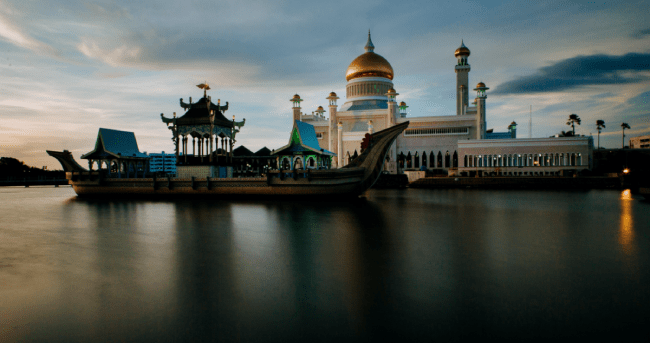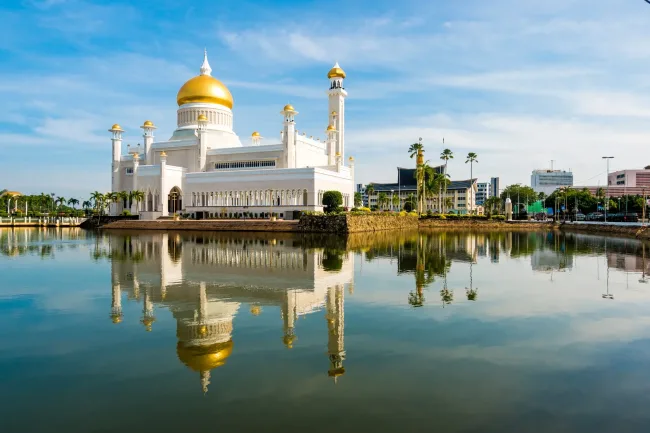
Welcome to Brunei Darussalam

Brunei, also called Brunei Darussalam, is a hidden gem in Southeast Asia, with a rich culture and history, diverse cuisine, and stunning natural beauty. Additionally, it’s famous for its ecotourism opportunities!
If you are planning a trip to this unique country, read this ultimate Brunei travel guide to help you make the most of your visit.
Document checklist for Brunei
-
Visa (if applicable)
-
Valid passport
-
Sufficient funds to cover your trip
-
Return or onward ticket
Essential Brunei travel information
-
Currency - Brunei dollar (B$). $1 is equivalent to approx. B$ 1.34.
-
Daily budget for 1 person - Allow a daily budget of B$ 70 ($52).
-
Languages - Brunei's official language is Malay. English is also widely used and is the language of instruction in most schools.
-
Number of travelers per year - In 2019, 4,449,000 travelers visited Brunei.
-
Socket type - Type G, 240V supply voltage and 50Hz.
-
Time zone - Brunei Darussalam Time (GMT+8).
-
Top 3 cities to visit - Bandar Seri Begawan, Kuala Belait, and Seria.
-
Top 3 landmarks/monuments - Omar Ali Saifuddien Mosque, Kampong Ayer, and Royal Regalia Museum.
Visa information for Brunei
Many visitors to Brunei do not require a visa for stays of up to 90 days, or can get a visa on arrival. However, it is always best to check the latest visa requirements and travel advisories before your trip.
Citizens of countries not eligible for visa-free entry or a visa on arrival must obtain a visa before traveling to Brunei. They can apply for a visa at the nearest Brunei diplomatic mission or online through the Brunei Immigration and National Registration website.
Visa difficulty index for Brunei
Accessibility: 3/5
Many people can visit Brunei visa-free. However, those that do need a visa must apply via the Brunei embassy or consulate.
Time to get your visa: 3/5
Brunei's authorities may take up to a month to process your visa application.
Costs: 4/5
The costs of the Brunei visa depend on your nationality but are generally relatively inexpensive.
Typical costs and budget for Brunei
A guide to what you'll spend daily traveling through Brunei on a mid-range budget.
-
Daily spending - Around B$ 70 ($52) per person, per day. This includes:
-
Meals - Expect to spend about B$ 10 ($7) per meal.
-
Transport - Depending on your travel plans and standard of travel, local transportation may cost up to B$ 3-5 ($2-4) per ride.
-
Hotel - The average hotel price in Brunei for a couple is B$ 50 ($37).
On average, a trip to Brunei for two people for one week will cost B$ 980 ($730).
Transport and best ways to travel around Brunei
Brunei is a small country, and getting around is relatively easy.
Flying to Brunei
The easiest way to get to Brunei is by flying into Brunei International Airport, which is located just outside the capital city, Bandar Seri Begawan.
Flights to Brunei are available from major cities in Southeast Asia, such as Singapore, Kuala Lumpur, Bangkok, and Manila, as well as from other international destinations like Dubai, Hong Kong, and Taipei.
Some airlines that operate flights to Brunei include:
-
Royal Brunei Airlines
-
Singapore Airlines
-
Malaysia Airlines
-
AirAsia
-
Cebu Pacific
Visitors can also enter Brunei overland from Malaysia, but this option may involve multiple checkpoints and longer travel time.
Arrival and immigration tips for Brunei
Here are some tips to help you navigate the airport in Brunei and make your arrival as smooth as possible:
-
Have your travel documents ready: Make sure you have your passport, visa (if required), and other necessary travel documents ready before you arrive. This will make the immigration process faster and easier.
-
Exchange currency: If you need to exchange currency, there are several currency exchange booths located in the airport. It is a good idea to use an ATM to get Brunei dollars affordably, as not all places in Brunei accept foreign currency.
-
Purchase a local SIM card: If you need a local SIM card for your phone, there are various providers located in the airport. This allows you to have access to data and make local calls.
-
Collect your luggage: After immigration, collect your luggage from the baggage claim area. Ensure you check that your luggage has not been damaged or tampered with.
-
Arrange transportation: If you have not arranged transportation beforehand, you can find taxis and ride-hailing services at the airport. Always negotiate or check the price before getting into the car.
Taxis and ride-hailing services in Brunei
Taxis are available in Brunei, and they are generally safe and reliable. Taxis are metered, and you can usually find them at taxi stands or hail them on the street. It's always a good idea to negotiate the fare with the driver before getting in the taxi.
Ride-hailing services like Grab and Dart are also available in Brunei. They are convenient and offer fixed fares, so there are no surprises regarding the cost.
Public buses in Brunei
Brunei has a good public transportation system, and buses are a cheap way to get around. They are modern and air-conditioned, and routes cover most major areas of the country.
Car rental in Brunei
Rental cars are available at the airport and in the city, and you will need an international driving permit to drive in Brunei.
If you like the idea of private transport but don’t feel comfortable driving yourself, renting a car with a driver is a common way to explore the country.
Safety in Brunei
Brunei is generally a safe country to visit, with a low crime rate and a friendly and welcoming population. However, like any other destination, there are some personal security precautions to remember when traveling to Brunei.
Here are some tips to help you stay safe:
-
Be aware of your surroundings: Always keep an eye on your belongings as petty crime may occur. Avoid walking alone in dark or deserted areas, especially at night.
-
Respect local laws and customs: Brunei is an Islamic country, and Sharia law applies. Visitors should respect local customs and laws. Dress modestly, especially when visiting religious sites, and avoid public displays of affection.
-
Stay hydrated: Brunei has a tropical climate that can get hot and humid. Drink plenty of water and avoid spending too much time in the sun.
-
Be cautious when driving: If you are renting a car or driving in Brunei, be cautious and follow local traffic laws. Some roads may be poorly maintained, and local drivers may drive aggressively.
-
Get travel medical insurance: If not, make sure your health insurance plan covers medical services, medical evacuation, and overseas medical costs.
-
Stay away from drugs: Drug possession, use, and trafficking are subject to severe penalties, such as jail terms, fines, and, in some cases, the death penalty.
Weather in Brunei
The best time to visit Brunei is between December and March, when the weather is dry and cool. However, Brunei's climate is tropical, so expect high temperatures and humidity year-round.
If you plan to visit during the rainy season, from April to November, be prepared for occasional downpours and thunderstorms.
Must do and see in Brunei
Don’t miss these awesome sights on your holiday to Brunei:
-
Visit the Sultan Omar Ali Saifuddien Mosque: This stunning mosque is one of the most iconic landmarks in Brunei, with its golden dome and intricate architecture.
-
Explore the Royal Regalia Museum: This museum showcases the history and culture of Brunei, with exhibits that include royal regalia, weaponry, and traditional costumes.
-
Take a boat tour of Kampong Ayer: Kampong Ayer is a historic water village in the heart of Bandar Seri Begawan. A boat tour will take you through the maze of stilt houses and provide a glimpse of daily life in this unique community.
-
Go jungle trekking in Ulu Temburong National Park: This pristine rainforest is home to a wide range of flora and fauna, including rare birds and primates. Guided tours are available for those who want to explore the park's trails and waterfalls.
Typical Brunei food to try
Brunei's cuisine is a fusion of Malay, Chinese, and Indian influences, with a focus on fresh seafood and spices. Don't miss the opportunity to try local delicacies such as:
-
Ambuyat - This is a traditional dish made with flour from the sago palm tree, mixed with water until it becomes a sticky, glue-like consistency. It is typically eaten with a variety of side dishes, including fish or meat curries, sambal (chili paste), and vegetables.
-
Nasi Katok - This popular street food in Brunei consists of steamed rice, fried chicken, and a spicy chili paste known as sambal. It's a simple but delicious dish that is commonly eaten for breakfast or lunch.
-
Kueh Tutu: Small, steamed rice cakes filled with grated coconut and brown sugar. They are a popular snack in Brunei and can be found at street food stalls and markets.
Vaccine information for Brunei
It's important to know what routine vaccines and COVID-19 measures are required to enter Brunei before booking your trip. We advise you to check the CDC website for more info about all vaccine requirements and recommended travel advice.
Ecotourism in Brunei
Brunei has quickly gained a reputation as a center of ecotourism in recent years. With 70% of the country's land pristine rainforests with abundant biodiversity, there are a lot of opportunities to explore the wilderness.
Explore Brunei's untouched natural spots and learn about nature preservation with these ecotourism hot spots:
-
Located in Temburong's lush rainforest, Sumbiling Eco Village welcomes travelers seeking to experience the traditions and cuisine of the local Iban culture. Over time, the locals have developed sustainable ways of using the rainforest to minimize ecological impacts.
-
Freme Rainforest Lodge offers an array of activities, including log obstacle courses, swings, climbs, zip lines, and a suspension bridge to enjoy the forest and nature's harmony, as well as local people’s lifestyles.
-
Ulu Temburong National Park is a popular untouched area in Brunei. Visitors can connect with nature by taking a boat down the Temburong River, admire amazing views, and take in the flora and fauna of the pristine rainforests.

 India Visa
India Visa
 Turkey Visa
Turkey Visa
 United States Visa
United States Visa
 Australia Visa
Australia Visa
 Colombia Visa
Colombia Visa
 New Zealand Visa
New Zealand Visa
 China Visa
China Visa
 Egypt Visa
Egypt Visa
 Vietnam Visa
Vietnam Visa
 Indonesia Visa
Indonesia Visa
